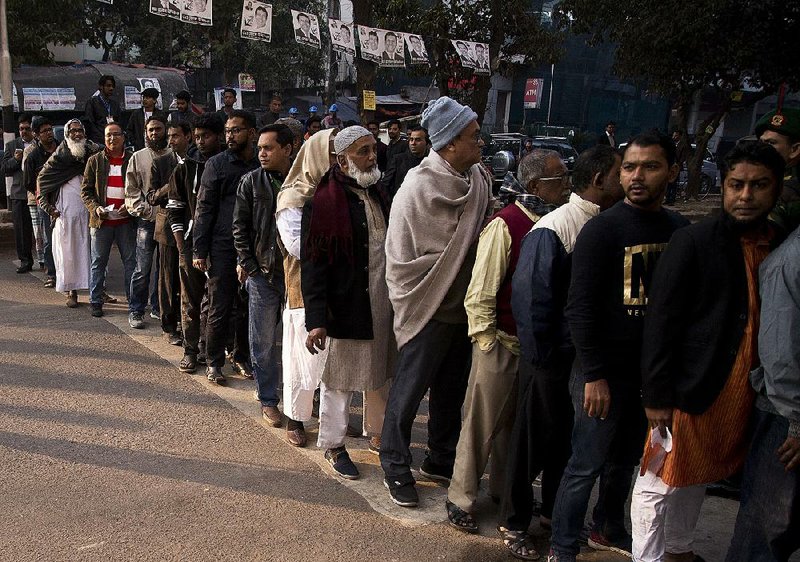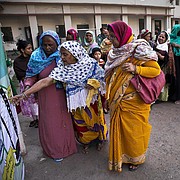DHAKA, Bangladesh -- More than a dozen people were killed in election-related violence in Bangladesh on Sunday, as voters went to the polls to decide whether to give Prime Minister Sheikh Hasina a third-consecutive term despite opposition claims that her leadership has become increasingly authoritarian.
The leader of Bangladesh's opposition alliance called Sunday's vote "farcical," saying any outcome would be rejected and demanding that a new election be held under the authority of a "nonpartisan government."
The election campaign was marred by allegations of arrests and jailing of thousands of Hasina's opponents.
Opposition leader Kamal Hossain said a few hours after voting ended that about 100 candidates from the alliance had withdrawn from their races during the day. He said the alliance would hold a meeting today to decide its next course.
"We call upon the Election Commission to declare this election void and demand a fresh election under a nonpartisan government," Hossain told reporters at a nationally broadcast news conference.
Calls to several Hasina aides seeking comment were not immediately returned.
Bangladesh's leading English-language newspaper, the Daily Star, said 16 people were killed in 13 districts in election-related violence.
In the run-up to the election, activists from both the ruling party and the opposition complained of attacks on supporters and candidates.
On Sunday, The Associated Press received more than 50 calls from people across the country who identified themselves as opposition supporters complaining of intimidation and threats, and being forced to vote in front of ruling party men inside polling booths.
"Some stray incidents have happened. We have asked our officials to deal with them," K.M. Nurul Huda, Bangladesh's chief election commissioner, said as he cast his vote in the capital, Dhaka.
The election campaign was marred by the arrests and jailing of what the opposition said were thousands of Hasina opponents, including six candidates for Parliament.
"Hasina's use of the state machinery to subjugate the opposition virtually ensures her electoral victory," said Sasha Riser-Kositsky, a South Asia analyst for the New York-based Eurasia Group.
Hasina has expressed confidence in the outcome, inviting election observers and foreign journalists to her official residence today, when the results were expected to be known.
While rights groups have sounded the alarms about the erosion of Bangladesh's democracy, Hasina has promoted a different narrative, highlighting an ambitious economic agenda that has propelled Bangladesh past larger neighbors Pakistan and India by some development measures.
Voters "will give us another opportunity to serve them so that we can maintain our upward trend of development, and take Bangladesh forward as a developing country," Hasina said after casting her ballot along with her daughter and sister in Dhaka.
Hasina's main rival is former Prime Minister Khaleda Zia, the leader of the opposition Bangladesh Nationalist Party. A court deemed her ineligible to run for office because she is in prison for corruption.
In Zia's absence, opposition parties formed a coalition led by Hossain, an 82-year-old Oxford-educated lawyer and former member of Hasina's Awami League party.
Both sides were hoping to avoid a repeat of 2014, when Zia and the Bangladesh Nationalist Party boycotted elections and voter turnout in the South Asian nation of 160 million was only 22 percent. More than half of the 300 parliamentary seats were uncontested. The Awami League's landslide victory was met with violence that left at least 22 people dead.
On Sunday, some 104 million people in the Muslim-majority country were eligible to vote, including many young, first-time voters.
Walking with a cane, Hossain cast his vote near his home in Dhaka, saying he was receiving complaints about vote-tampering and intimidation from various parts of the country.
The more than 40,000 polling stations nationwide closed at 4 p.m., as the Islamic call to prayer came over loudspeakers.
About 600,000 security officials, including army and paramilitary forces, were deployed across the country in a bid to contain violence in Bangladesh's 11th general election. The country's telecommunications regulator shut down mobile Internet services nationwide to prevent possible protests from organizing.
The normally traffic-clogged streets of the capital were largely empty because of a ban on vehicles for everyone except election observers and journalists. Many Dhaka residents had left days earlier to vote in their hometowns.
At one polling station, Istiaq Ahmed, a doctor in Dhaka, said it was critical that people "select the right government to maintain the development and enrich our country further."
Another voter, Sultana Rajia Rotna, said she went out to cast her ballot after hearing that the streets of Dhaka were peaceful.
"I think the country has already developed much and it will be developed more," she said in Bengali. "That's why I'm here casting my vote."
A Section on 12/31/2018

